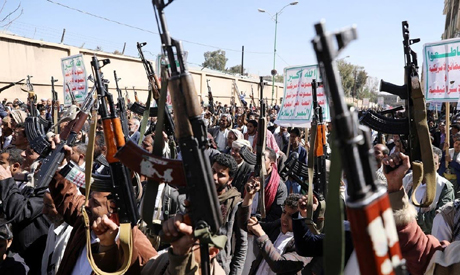
Houthi supporters hold up their weapons during a demonstration against the US decision to designate the Houthis as a foreign terrorist organization, in Sanaa, Jan. 20, 2021. Reuters
The United States on Thursday imposed sanctions targeting Yemen's Houthi rebels as it voiced exasperation that the Iranian-banked insurgents have kept up a military campaign.
President Joe Biden's administration -- which has used sanctions more sparingly than Donald Trump's previous team -- also removed sanctions on several former Iranian officials, saying it was acknowledging changes in behavior.
The Treasury Department said it was imposing sanctions on several individuals including Said al-Jamal, a Houthi supporter who allegedly has run a smuggling network out of Iran to sell oil illicitly to benefit the insurgents.
Secretary of State Antony Blinken said it was hoping to exert pressure on the Houthi rebels to end their offensive launched in February to seize Marib, the last significant pocket of government-held territory in the north.
"It is time for the Houthis to accept a ceasefire and for all parties to resume political talks," Blinken said in a statement.
"The United States will continue to apply pressure to the Houthis, including through targeted sanctions, to advance those goals," he said.
The Biden administration, in one of its first steps, removed a last-minute designation by Trump of the Houthis as a terrorist movement.
The move came in response to fears from aid groups that they would need to pull out of Yemen as they are obliged to deal with the Houthis, who effectively are the government in vast areas including the capital Sanaa.
The Biden administration has ramped up diplomatic efforts on Yemen, which the United States considers the world's worst humanitarian crisis, and distanced itself from air campaign by neighboring Saudi Arabia.
Critics of US sanctions policy have said that targeted individuals have little recourse to get off the blacklist, even if they address concerns.
Short link: